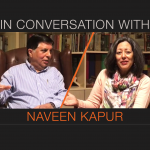“IRAQ!!!!!!! Are you crazy, Cooper” exclaimed my shocked fellow alumnus from St.Stephen’s College – the brightest star in our 1975 batch – Arunava Sen. Our paths had crossed after 18 years by sheer coincidence at the Queen Alia Airport, Amman in the summer of 1996. Arunava was heading to the transit lounge to board a flight to Europe for a research project on Economics Game Theory and I was heading towards the immigration and exit gate to the long hard road to Baghdad. One could hardly blame my classmate.
Iraq had been devastated by the ten year war with Iran followed by the 1991 invasion by the US led coalition. It was further crippled by UN sanctions – though the sanctions had been lifted partially to allow limited supplies for humanitarian purposes.

An air embargo was still in force, which meant I traveled a thousand kms. from Amman, Jordan to Baghdad by road, through some of the most inhospitable terrain imaginable. Desert terrain where the scorching heat reached 55 degrees centigrade, sixteen hour power cuts, and telex being the only mode of communication with the outside world.
Post War Iraq was not for the fainthearted.
For one whole month, Waleed, my agent, and I had visited every Ministry, scouting for business. Nothing. Then one window of opportunity sprang open – it was a tender floated by the Ministry of Education and we were invited to bid for it.
But…there were 27 items in the requisition, and we were required to bid for all. We had quotes for 25. If we didn’t bid for items #26 & 27, (cut sections of petrol and diesel engines, of all things!) we would not even qualify. Less than 12 hours to fill in the blanks!
What price to charge for cut sections of engines? What were cut sections of engines? Turns out they were for training mechanics!
It was midnight, and as we headed off for some food, I hoped that food for thought was on the menu. Waleed took me to a restaurant on the banks of the Tigris river for a leisurely meal of Mesopotamian Masgouf Semach – a carp caught from the Tigris and grilled in a unique recipe and style unchanged from the Babylonian times .

While washing down the Masgouf with small glasses (istekans) of heavy sugar laden tea, Waleed spoke – “Why can’t we “guesstimate” the cost of the cut sections of the two engines, and make the offer to MOE?”
He was right!!! My 1970s Ambassador (car) engine had packed up recently and I had to have it replaced at a cost of Rs. 25,000. Add another Rs. 25,000 towards the cost of making a cut section, and top it up with a contingency/profit of Rs. 25,000 – a total of Rs 75,000 (USD 2,000 at the prevailing exchange rate). Since diesel cars were more expensive the price of a cut section of diesel could be marked up to USD 2,200.
By working through the night, we were ready with our offer on all 27 items the next morning just in time for the closing of the tender. Waleed’s excitement was palpable – his glasses glistened and even his moustache quivered, as we put our tender to bed.
The decision making for the Army generals turned bureaucrats was painfully slow. We camped in Baghdad another month, awaiting the tender results, and scouting for more business opportunities in the interim. I used the weekends to delve into the history of Mesopotamia, visit historic Babylon, learn Arabic and indulge my passion for Persian carpets and bedouin sumaks (rugs) including a visit to a Bedouin tea leaves reader in the holy town of Karbala who prophesied “Sidiki (my friend) Insha allah you will visit Iraq several times after the first.”
 The Tender results were announced.
The Tender results were announced.
We had won by a wide margin!! While we were competitive in some items and non competitive in others in the list of 25, the scales tipped in our favor on items 26 and 27 – the cut sections! The Italians had bid USD 6,000 while the British bid USD 6,500 – against our USD 2,000 !
We signed the contract for USD 2 million. But the euphoria didn’t last long. Now we had to find 200 ‘cut sections’ each for item #26 & 27!
Back in India, my search for a supplier for the cut sections that we had blithely bid for, was frantic. Finally I found one ITI (vocational training institute) in Nizammuddin that had them…only to have my hopes shattered! An old complete cut section of a TATA – Mercedes truck from the 1960s – not what I was looking for – and we were in 1996!
I turned back, disappointed, discouraged and almost in despair, when a security guard called me back. He handed me an oil stained business card of a company whose address could barely be read through the translucent oil glaze –in an unheard of place in a trans Jamuna colony! Serendipity!

After navigating several potholes and overflowing drains I reached my destination – and the moment of truth. A half broken staircase took me to the roof top office of a cramped tenement. A rather shabbily dressed man, in an office masquerading as a workshop with auto parts strewn all over opened the door. “Do you make cut sections of engines,” I asked in desperation without introducing myself .
“Yes! Yes! We do!” Sharmaji’s instant positive reply made me mildly suspicious. Was he the archetype glib talking North Indian businessman who never says “No” but only “Yes” to everything and delivers nothing ?
He fished out a dog-eared photo album and showed me an array of automotive equipment including up-to-date cut sections of engines! Our discussions thereafter revealed the frugal engineering skills of Indians aka Jugaad !
Sharmaji explained that to teach students of vocational institutes about the working of pistons etc. with the use of cut sections, the “condemned “- end of life engines served beautifully. Best part? He bought them from the automotive kabbadiwalas in the“Engine market” in Mayapuri!
Cost: Sharmaji took out a paan stained diary and wrote “The cost of engines Rs 5,000 (petrol) Rs 6,000 (diesel), cost of phospating, pickling, electric motor and other value additions Rs 10,000 so total price Rs 15,000 and Rs 16,000 respectively.”
The samples were ordered and sent for buyer approval. Approved !
The assumptions Waleed and I had made in the Hotel Al Rasheed room in Baghdad were off by a mile. This was an unbelievable windfall for the price guesstimated and contracted by us of Rs 75,000 and Rs 85,000 based on new engines.
A win – win to the Iraqi buyer and us.
Sharmaji’s jugaad delivered whopping profits!

The Bedouin tea cup reader had delivered …. I visited Iraq several times after that eventful first visit until the War of 2003!
Lessons learnt from the Iraqi adventure :
- Tough markets with difficult conditions are fertile grounds for business since most competitors do not venture “where eagles dare”.
- In business take calculated risks and think on your feet.
- Fears are more than welcome to come along for the ride in business but they shouldn’t send you on detours or grab the wheel. Let fears take the back seat in your ride.
- And drink lots of istekan tea with Bedouin tea leaves readers!





